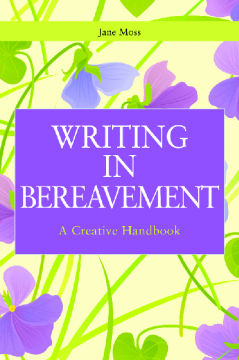
Additional Information
Book Details
Abstract
Writing in Bereavement is a practical creative handbook that will assist counsellors, volunteers and others in their work with bereaved adults. Writing is a powerful outlet for the emotions that accompany grief and it is therefore a valuable therapeutic tool to help those who are bereaved communicate their experiences and adjust to life after their loss.
Jane Moss provides imaginative creative writing exercises for groups and individuals, using a variety of genres and literary forms and techniques. She offers advice on how to plan and run successful workshops with the bereaved, and how to evaluate their effectiveness. Using the techniques in this book, counsellors can help grieving individuals find a voice to cope with profound changes in their life, complete unfinished conversations, write for remembrance, use creativity as a respite from sadness, and finally begin to move forward from grief and imagine the future.
This book is a useful addition to the literature and will be of great interest to therapeutic practitioners and creative writers alike... Readers who are not already familiar with the literature of therapeutic writing will find themselves gently guided through the principles and practices.
Therapy Today, Kate Thompson, existential psychoterapists, journal therapist and author
When someone we love dies we lose, not only a person "out there", but an organising principle of our assumptive world, the world that, up to that moment, we had taken for granted. Grief is not about forgetting the dead, it is about discovering a new narrative, a new source of meaning to our lives. Jane Moss here shows us a way of helping bereaved people to do just that. It gives us a choice of techniques and suggestions, exercises and insights, that are well supported by research and which we can adapt to the particular needs of individuals at this turning point in their lives.
Colin Murray Parkes, OBE, MD, FRCPsych, psychiatrist, author and Life President of Cruse Bereavement Care, UK
Jane Moss's Writing in bereavement is a breath of fresh air... At every stage she reflects back on the theory of bereavement support, whilst giving examples of work that might be produced, and how the facilitator may respond. Creating space to reflect by both the facilitator and the participants is the key word, and Moss gives plenty of support and advice on how to approach this.
Bereavement Care
Jane Moss has an MA in Creative Writing in the Community from St. Mary's University College, University of Surrey. She is a tutor in creative writing for Kingston Adult College and a visiting lecturer at the University of Hertfordshire. She is a volunteer with Cruse Bereavement Care and runs bereavement writing groups in partnership with Princess Alice Hospice in Surrey and the MacMillan counselling team at Meadow House Hospice in west London. She is also a freelance consultant specialising in organisational development and marketing for arts organisations.
Bereavement can be a dark and lonely place. This book shows how writing in groups can help bereaved people to find companionship and to begin to map out their own paths through this alien landscape. The book is thoroughly researched and offers a clear and systematic toolkit for professionals. On top of this, it is an engaging read that should leave readers feeling inspired to try this approach within their own work.
Anne Cullen, Manager of Psychosocial and Spiritual Care, Princess Alice Hospice, Esher, UK
Here is a wealth of ideas and inspiration for those of us aspiring to work creatively with bereaved people using the written word. I found my creative juices begin to flow as I read the ideas for the exercises and how to use them. These will be of enormous benefit for those wanting to start working in this way and will provide added incentive and encouragement for those who already use creative tools. I could use the ideas not only with the bereaved person but also with volunteer supporters in their supervision. The example of the fictional Greenbank writing group will be of special interest to those who want to offer support groups for bereaved people and there is much practical help offered for setting up such a group. I am sure this will prove to be a truly useful volume to have for reference and advice for those of us working in the field of bereavement support and counselling.
Dodie Graves, counsellor, bereavement service co-ordinator and author of Talking with Bereaved People and Setting Up and Facilitating Bereavement Support Groups
Moss helps mourners reach deeply into the wordless silence at the heart of grief, and render what they discover in language that is resonant with meaning and emotion. From acrostics to villanelles, and from the opening group warm-up to the final wind-down, she scaffolds a structure for Writing in Bereavement that fosters continuity and connection in life narratives rewritten by the experience of loss. Whether you work with bereavement support groups or in the intimate crucible of grief therapy, you will find in this book an indispensable muse to your clinical creativity.
Robert A. Neimeyer, PhD, editor of Techniques of Grief Therapy: Creative Practices for Counseling the Bereaved
